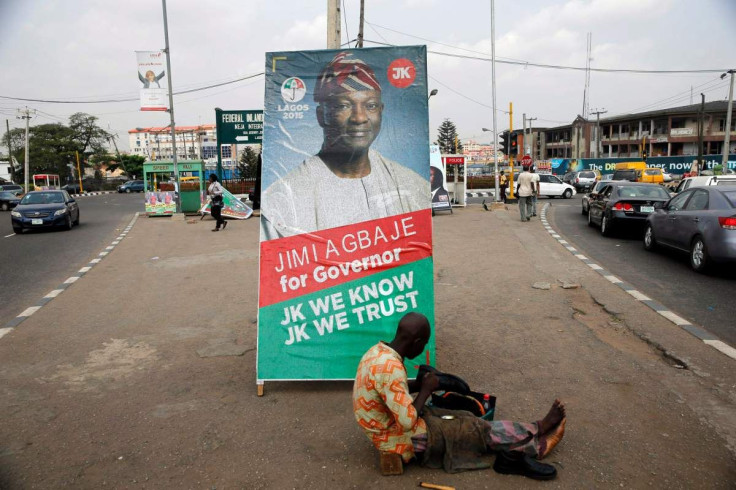Nigeria Elections 2015: Gubernatorial Contests Could Make Or Break Fragile Democracy

Nigeria's gubernatorial elections on Saturday will mark the latest test for the West African nation's fragile democracy. Two weeks after the ruling Peoples Democratic Party (PDP) lost the presidency and its senatorial majority for the first time in 16 years, the right-wing party seems on the brink of collapse, which would again leave Nigerians without a viable opposition.
To regain leverage and political relevance, the PDP must retain control of 21 of the 36 state governments in the country, and then make an impact in key swing states currently held by the All Progressives Congress (APC). The high stakes mean that whatever happens at the polls Saturday could make or break the PDP’s political power in Nigeria after President Goodluck Jonathan's recent loss to President-elect Muhammadu Buhari of the APC.
“The APC victory was very important in setting the tone for Saturday’s elections,” said Darren Kew, an associate professor of conflict resolution at the University of Massachusetts in Boston. “The APC certainly has the wind in its sails.”
Soft Landing?
Nigerian governors -- like the president -- are limited to two four-year terms. Governors are charged with distributing federally allocated revenue and shaping the security and policy development in their states, the Africa Report says.
The PDP has maintained a plurality of state governorships in Nigeria since democracy emerged in 1999. But the PDP lost five seats last year and is fighting to reclaim support. The party's national chairman, Adamu Mu’azu, said the gubernatorial election could provide a soft landing if the party can win 24 states, including Lagos, Rivers and Imo.
“I urge the PDP faithful to pick up the pieces and ensure that we return quickly to our old winning ways. There should be no room for voter apathy that was a major factor to our losing the presidential election,” Mu’azu said Saturday, the Premium Times reported. “Nothing will be sweeter than PDP taking Lagos, our own Rivers state and Imo.”
Rallying voters could be a difficult challenge for the PDP after it conceded the presidency to the APC on March 28. While the PDP governorship candidates maintain a campaign finance edge over their opposition rivals, some states will likely jump on the APC bandwagon.
“I think now, inevitably, some states will swing toward APC, as there can be a premium on being in the political mainstream,” said Oliver Owen, a junior research fellow in international development at the University of Oxford. “Though paradoxically, PDP opponents may still do well in some APC strongholds such as Lagos and Kano as the local candidates are very strong.”
Tight Contest
The gubernatorial election in Lagos is expected to be a tight contest between the two rival parties. Lagos is Nigeria’s most populous state and home to some of its wealthiest citizens. While elections in Nigeria are often divided between Muslim and Christian voters, both governorship candidates in Lagos -- the APC's Akinwunmi Ambode and the PDP's Jimi Agbaje -- are Christians.
Kano is Nigeria’s second most populous state, and the most populous in the north, making it another key seat for the PDP to win Saturday. The current Kano state governor, Rabiu Musa Kwankwaso, recently left the PDP for the APC after his reelection. The northern state has been crippled by poverty and frequent attacks by Boko Haram insurgents, making the APC an appealing choice.
Some are concerned that without a strong opposition party in Nigeria democracy will be compromised and the party-elect APC will fall into its predecessor's bad habits of deceit and corruption. Under the PDP, more than 70 percent of the federal budget is spent on the salaries and benefits of public officials. PDP officials have also been widely accused of ballot rigging and voter intimidation in alleged attempts to fix elections. Four opposition parties in 2013 merged to form the APC with a goal of knocking the PDP from its 16-year rule.
“If Nigeria were to completely lose the PDP, I think that would be a real problem,” Kew said Tuesday. “The APC is made up of elements of the old PDP. The old patterns would reassert themselves in many different ways.”
© Copyright IBTimes 2024. All rights reserved.





















